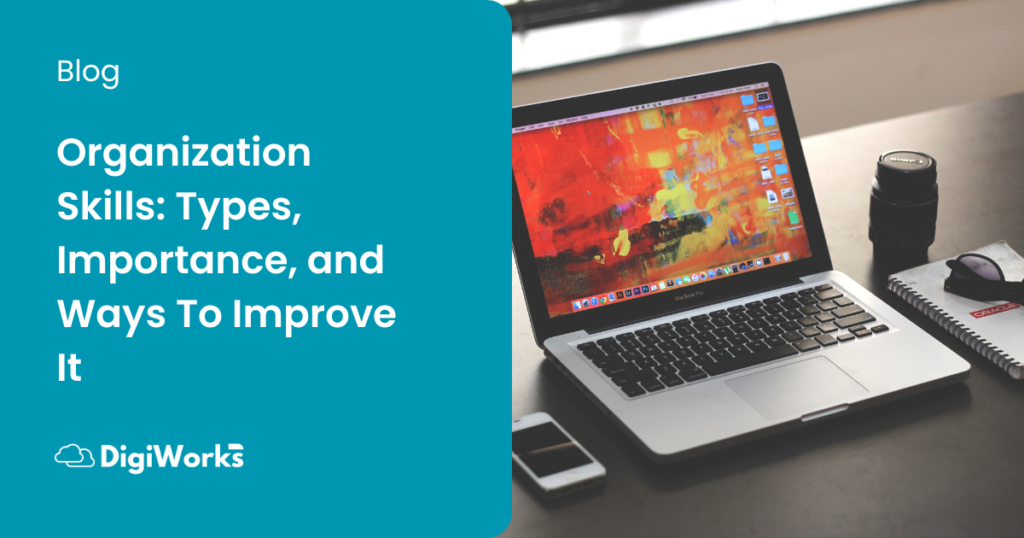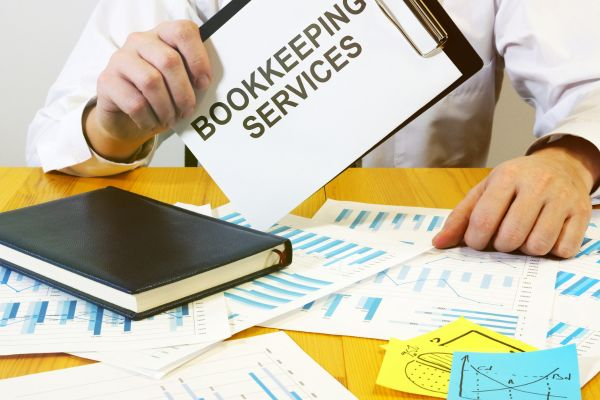Apr 27, 2023 • 13 min read

Organizational skills can be the difference between success and failure in the workplace. Just like a ship needs a captain to stay on course, effective organization is essential for any business to achieve its goals. A team of structured workers and their ability to manage time, set goals, and stay motivated can make a huge impact on how an organization functions. In this article, we will explore what organizational skills are, why they’re important, the different types of organizational skills, and how you can improve them in your work life.
You’ll learn:
- What are organizational skills?
- Importance of effective organization
- Types of organizational skills
- How to Improve Organizational Skills
- Organizational Skills at Work
Ready to build your remote team?
Use the DigiWorks platform to hire, manage, and pay remote talent from all over the world.
What are organizational skills?
Organizational skills are the ability to plan, prioritize, and stay on top of tasks. They’re essential for any successful business or individual looking to reach their goals. Good organizational skills allow you to create a system that works for you and helps you meet deadlines while staying productive. Knowing what needs to be done, when it needs to be done by, and how best to get it done are all elements of organizational skill sets.
Additionally, effective communication between team members is also an important part of organization as it allows everyone to stay on the same page and work together more efficiently. By having strong organizational skills, you can make sure that tasks are completed in a timely manner without leaving anything out or falling behind schedule.
Importance of effective organization
Organization is essential to success in any field. It helps you stay focused, prioritize tasks, manage time, and ultimately reach your goals. Effective organizational skills enable you to stay on top of projects, see the bigger picture, and better anticipate changes in the workplace. Poor organization can lead to missed deadlines and a disordered work environment. Additionally, when employees lack organization skills, it can cause tension and confusion among team members.
Proper organization can help you save time by keeping everything organized and accessible so that everyone involved knows where to find information when it’s needed. Additionally, it encourages collaboration between coworkers as they are able to communicate more easily due to having an organized system in place.
Furthermore, effective organization leads to increased productivity as tasks are accomplished quickly and efficiently without running into any roadblocks along the way. By developing strong organizational skills now, you will be able to reap the benefits for years to come.
Types of organizational skills
Organizational skills are an important part of any job or career. These skills help you stay organized and efficient, allowing you to get more done in a shorter amount of time. There are many different types of organizational skills that can be used to help increase productivity and efficiency at work.
1. Time management
Time management is an essential organizational skill that is crucial for any job or career. Being able to plan ahead and manage your tasks properly ensures that you are productive and efficient in the workplace. Time management skills involve allowing yourself enough time to finish tasks, not spending too much time on any one project and balancing the time you spend at home and work.
Developing good habits such as writing down deadlines, breaking large projects into more manageable chunks, and saying no to distractions can help you stay organized and on track. Additionally, taking regular breaks throughout the day helps keep your energy levels up while also encouraging creative thinking. By implementing proper time management techniques into your daily life, you can increase your productivity and set yourself up for success now and in the future.
2. Communication
Communication is an important organizational skill that can help you succeed in any job. Communication involves being able to effectively share and receive information, such as instructions, ideas, and feedback. It also involves being able to actively listen and respond appropriately to questions or concerns from your colleagues. In order to be an effective communicator, it’s important to keep conversations clear and concise, use appropriate language, and maintain a positive attitude throughout all interactions.
Additionally, it’s helpful to practice active listening skills which involve concentrating on what others are saying and acknowledging their points of view rather than simply waiting for your turn to talk. By developing strong communication skills, you can ensure that tasks are completed in a timely manner, as well as have more successful relationships with your peers.
3. Setting goals
Setting goals is an essential organizational skill that can help you stay on track and reach success. Goals should be realistic, measurable, and achievable. Effective goal setting is thinking about what you want to accomplish in the short-term and long-term. Then, break these down into smaller steps and create a timeline for each step.
Make sure to also consider any resources you need and identify potential roadblocks or challenges that could come up along the way. Writing down your goals can help keep you motivated and accountable. Additionally, it’s important to review your progress regularly to make sure you are on track. With practice, efficient goal setting skills can help ensure that your efforts bring the desired results.
4. Delegation
Delegation skills are a great way to increase productivity. It involves assigning tasks to the right people and trusting them to complete the work. Before you delegate tasks, it’s important to assess each member of the team and decide who is best qualified for the task. Once you have chosen a person, set clear expectations and provide guidance when needed. Make sure that they understand their role in the project and have access to any resources they may need.
Additionally, it’s important to set deadlines for each task and check in periodically to ensure progress is being made. When done correctly, delegation can help create a positive working environment where everyone feels empowered and inspired.
5. Working under pressure
Working under pressure can be an intimidating challenge, but it’s also an important skill to master. To work effectively in a fast-paced environment, you need to prioritize tasks and manage your time wisely. Start by creating a plan that outlines the steps needed to complete each task and set realistic deadlines. This way, you’ll be able to focus on one task at a time without feeling overwhelmed.
It’s also important to stay organized and use resources efficiently. Prioritize the most important tasks first and create checklists for yourself so that you don’t forget anything. Finally, take regular breaks throughout the day so that you can recharge and maintain your energy levels. With practice and discipline, you’ll be able to work efficiently under pressure and achieve great results.
6. Self-motivation
Self-motivation is a critical skill that can help you reach your goals and achieve success. To stay motivated, it’s important to set realistic and achievable goals for yourself. Break down larger objectives into smaller manageable steps and create a timeline for completion. Positive reinforcement can also be helpful in maintaining motivation; reward yourself for completing tasks or reaching milestones.
Additionally, take time to reflect on your accomplishments so that you can recognize the progress you have made. Finally, try to surround yourself with people who are positive and supportive of you and your goals.
7. Analytical thinking
Analytical thinking is a crucial skill for success in the workplace. It involves taking information and data, breaking it down into its components, and understanding how those pieces fit together. Analytical thinking also requires being able to apply logic to solve problems and identify patterns or trends. To become better at analytical thinking, practice breaking down complex tasks into smaller parts and identifying potential solutions.
Additionally, consider looking at data from different angles or perspectives to gain a fuller understanding of the situation. With practice, analytical thinking can become second nature, allowing you to quickly address issues and make better decisions.
8. Attention to detail
Attention to detail is an essential skill in the workplace and can make a huge difference in the quality of work you produce. It involves paying close attention to all aspects of a task, from small details to larger concepts. To cultivate this skill, practice taking time to review your work before submitting it or completing a task. This will help ensure that you have not missed any important points or facts.
Additionally, look for ways to streamline processes by eliminating unnecessary steps and double-checking for accuracy along the way. With enough practice, you will be able to spot errors quickly and make sure all aspects of a project are properly completed.
9. Decision-making
Decision-making is a key skill in any workplace. Being able to make informed decisions in a timely manner can greatly improve the efficiency of any team or organization. To improve decision making skills, start by gathering all relevant information before you decide on a course of action. Consider different perspectives and alternatives, and weigh the pros and cons of each option. Once you have made your decision, take time to reflect on how it might impact your team or company. This will help you learn and become better in making effective decisions in the future.
10. Strategic planning
Strategic planning is an essential skill for any organization. It involves creating a plan of action that outlines how an organization can achieve its objectives and goals in the long-term. Strategic planning requires careful consideration of resources, capabilities, and options available to reach the desired outcome. This may involve analyzing current trends in the industry, setting short-term and long-term goals, and developing strategies to reach those goals.
Additionally, it is important to monitor progress against these goals on a regular basis to ensure that the strategy remains effective over time. With strategic planning skills, organizations can identify opportunities for growth and develop plans for reaching their goals efficiently and effectively.

How to Improve Organizational Skills
Organizational skills are essential for success in any field. Being organized helps you stay on task, manage your time more effectively, and achieve your goals with greater ease. Here are some tips for improving your organizational skills:
1. Own your calendar.
Owning your calendar is an important part of staying organized. Taking the time to plan out when you need to get certain tasks done and block off time for meetings or other commitments can help you stay on top of your schedule. Additionally, it’s important to know how you work best, such as if you prefer to have all your meetings back-to-back rather than spread out throughout the day.
By setting reminders and utilizing technology tools, you can ensure that nothing gets forgotten or overlooked and that you’re always on top of your tasks. By taking control of your calendar, you will be able to improve your organizational skills and maximize efficiency in your professional and personal life.
2. Make to-do lists.
Making to-do lists is an essential organizational skill. Taking the time to create a list of all the tasks that need to get done can help you stay focused and on track. Start by writing down everything you need to do, then prioritize those tasks. This will help ensure you’re tackling the most important items first which will ultimately make your job easier in the long run.
Additionally, break down larger projects into smaller, manageable tasks and assign yourself deadlines for each task. Finally, keep your lists organized so you can quickly access them when needed. By making and organizing your to-do lists, you can stay organized and productive throughout the day.
3. Figure out what tools will help you.
Figuring out which tools will help you stay organized is a crucial part of developing effective organizational skills. Whether you prefer physical or digital tools, there are plenty of options available to keep your work life running smoothly. Physical tools like calendars, planners and notebooks can be great for writing down tasks and tracking progress on larger projects. Digital tools like project management apps and task lists can be used to set deadlines, assign tasks and track progress.
Additionally, calendar apps and online document sharing programs can be invaluable when it comes to managing tasks with multiple people involved. Finally, invest in a good filing system so that you can easily store all your important documents. By finding the right combination of organizational tools for your needs, you’ll be able to maximize efficiency and productivity in your professional life.
Digital Tools
Digital tools are becoming increasingly popular for those looking to develop their organizational skills. Digital tools like project management apps, task lists and calendar apps can help users stay on top of their tasks and deadlines. Many of these digital tools have additional features that allow users to assign tasks to other people in the group or keep track of progress on larger projects.
Additionally, document sharing services make it easy to share documents with multiple people without having to email them individually. These services also make it easier to access documents from any device with an internet connection. By utilizing the right digital tools, users can maximize efficiency and increase collaboration skills within the team.
4. Declutter your workspace.
A cluttered workspace can be a major distraction and make it difficult to focus on the task at hand. To ensure an organized workspace, it is important to declutter your desk or digital workspace. Start by removing any items that are not related to your current task or project. This could include old paperwork, non-essential office supplies, or for digital workspace, unnecessary window tabs and cluttered desktop.
Once everything that isn’t needed is removed from the desk, organize the remaining materials in a way that makes them easily accessible. This could include using binders and file folders for paperwork, labeled containers for office supplies, and designated spots for items like pens and pencils. Having an organized workspace can help improve productivity and overall organization skills.
Ready to build your remote team?
Use the DigiWorks platform to hire, manage, and pay remote talent from all over the world.
Organizational Skills at Work
Organizational skills are an essential part of success in the workplace. They help ensure that tasks are completed on time and efficiently, which can ultimately lead to improved productivity. To develop strong organizational skills, there are a few steps you can take.
First, it’s important to create a daily or weekly schedule for yourself. This will help you keep track of tasks that need to be completed and deadlines that need to be met. Additionally, breaking larger projects down into smaller chunks can make them easier to manage and complete on time.
Another way to stay organized is by using lists or checklists for tasks. Writing things down helps ensure that nothing is forgotten, and it also allows you to prioritize your tasks in order of importance.
Finally, planning ahead is key when it comes to staying organized at work. By understanding what needs to be done ahead of time, you can plan out how much time each task will take and make sure everything gets done in a timely manner.
Organizational skills are invaluable assets in the workplace and with some practice they can easily become second nature. Implementing these tips will help you remain focused and organized throughout all your work tasks.
Related Articles
About DigiWorks
DigiWorks is an easy-to-use platform that helps small businesses and startups manage remote talent from around the world. DigiWorks offers a way for you to onboard, train, and pay people from all countries. Looking for an all-in-one platform where you can hire, manage, and build your remote team? Speak with us today and we’ll help you achieve your business goals!


